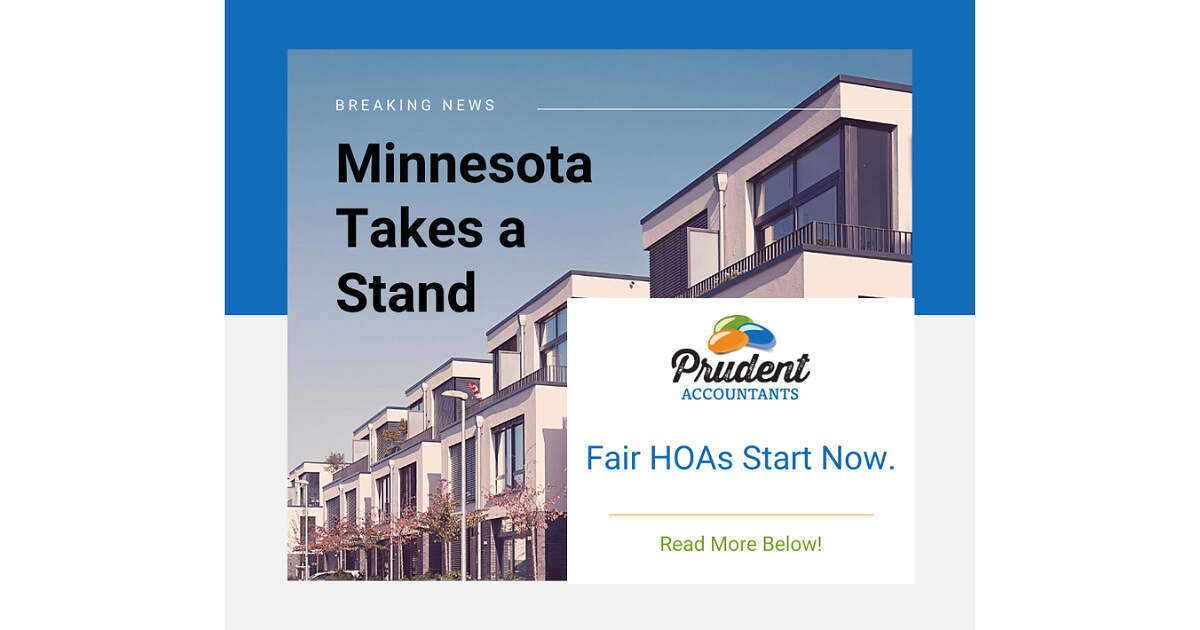Minnesota Cracks Down on HOA Overreach: What Homeowners and Boards Need to Know

Homeowners across Minnesota have long aired frustrations over aggressive homeowners association (HOA) boards—associations levying arbitrary fines, refusing access to financial records, and threatening foreclosure over unpaid dues. Until now, many of these powers went unchecked.
But a new bill passed in early May 2025 changes that. In a significant move toward greater homeowner protections, the Minnesota Legislature has passed a bipartisan bill to reform HOA governance, transparency, and enforcement powers. This is big news—not just for homeowners, but for anyone involved in HOA management, real estate, accounting, or property law.
If signed into law by Governor Tim Walz—as expected—these reforms will take effect August 1, 2025.
Let’s break down what this means and why it matters.
What’s in the Bill?
The bill—formally known as SF 3158 / HF 3348—introduces new statewide requirements designed to create greater accountability and fairness in how HOAs operate. While larger associations already governed under Minnesota’s 1994 Common Interest Ownership Act (MCIOA) follow certain rules, many smaller or older HOAs have operated with minimal oversight. This bill closes that gap.
Here are the most significant provisions:
1. Guaranteed Access to Financial Records
One of the most impactful parts of the bill is that homeowners now have a legal right to access HOA financial documents, regardless of whether their association falls under MCIOA.
This includes:
- Annual budgets
- Reserve fund balances
- Monthly financial statements
- Bank records
In the past, many HOAs refused these requests without consequence. Now, withholding financial information is a legal violation.
Why it matters: Financial transparency is the foundation of accountability. Homeowners deserve to know how their dues are being spent, whether reserves are adequate, and if the HOA is being responsibly managed.
2. Restrictions on Fines and Enforcement
Under the new law, HOAs must follow due process before issuing fines. That means:
- Homeowners must receive written notice of a violation
- They must be given a reasonable amount of time to correct it
- Only after this can a fine be imposed—and it must be reasonable
This puts an end to the practice of instantly levying large fines for minor infractions like uncut grass or a basketball hoop in the driveway.
Why it matters: This change helps prevent financial abuse and arbitrary enforcement. It also creates clearer expectations for homeowners and HOAs alike.
3. Tighter Controls on Foreclosures
Perhaps the most sensitive issue addressed in the bill is foreclosure. The legislation limits an HOA’s ability to foreclose on a home based on unpaid dues—especially small or disputed amounts.
HOAs must now follow more stringent legal steps before initiating foreclosure. This includes:
- Providing adequate notice
- Offering payment options
- Ensuring disputes are fairly addressed before moving forward
Why it matters: People should not lose their homes over relatively small amounts of unpaid fees. This provision protects vulnerable homeowners while still allowing HOAs to collect dues through appropriate legal channels.
4. Stronger Governance and Oversight
The bill includes provisions aimed at improving the democratic function of HOAs, including:
- Requiring open meetings
- Ensuring fair and accessible board elections
- Preventing boards from making major decisions without homeowner input
Why it matters: Many homeowners feel disconnected from decisions that affect their property values and community policies. This part of the bill restores a measure of balance between board power and homeowner rights.
Who Does This Affect?
These reforms apply to virtually all HOAs in Minnesota, including those not previously governed by MCIOA. That’s over 7,700 associations representing hundreds of thousands of residents, according to state estimates.
This law also affects:
- Board members and HOA managers, who now face stricter compliance requirements
- Real estate professionals, who must advise clients about governance practices
- Accountants and financial professionals, who should ensure that HOAs maintain proper documentation and transparency
What Should You Do Next?
Whether you’re a homeowner, a board member, or a financial advisor, here are some steps to take now:
- Review your governing documents to see how they align with the new law.
- Ensure financials are in order and accessible upon request.
- Train board members on compliance and due process obligations.
- Prepare for more homeowner engagement—residents will be more empowered to ask questions and request transparency.
Final Thoughts
This bill marks a major shift in how HOAs operate in Minnesota. For too long, a lack of transparency and accountability has led to conflict and even financial harm. With these new rules, homeowners will have more rights, and boards will need to operate with greater care and clarity.
It’s a win for fairness—and a moment for proactive planning.
